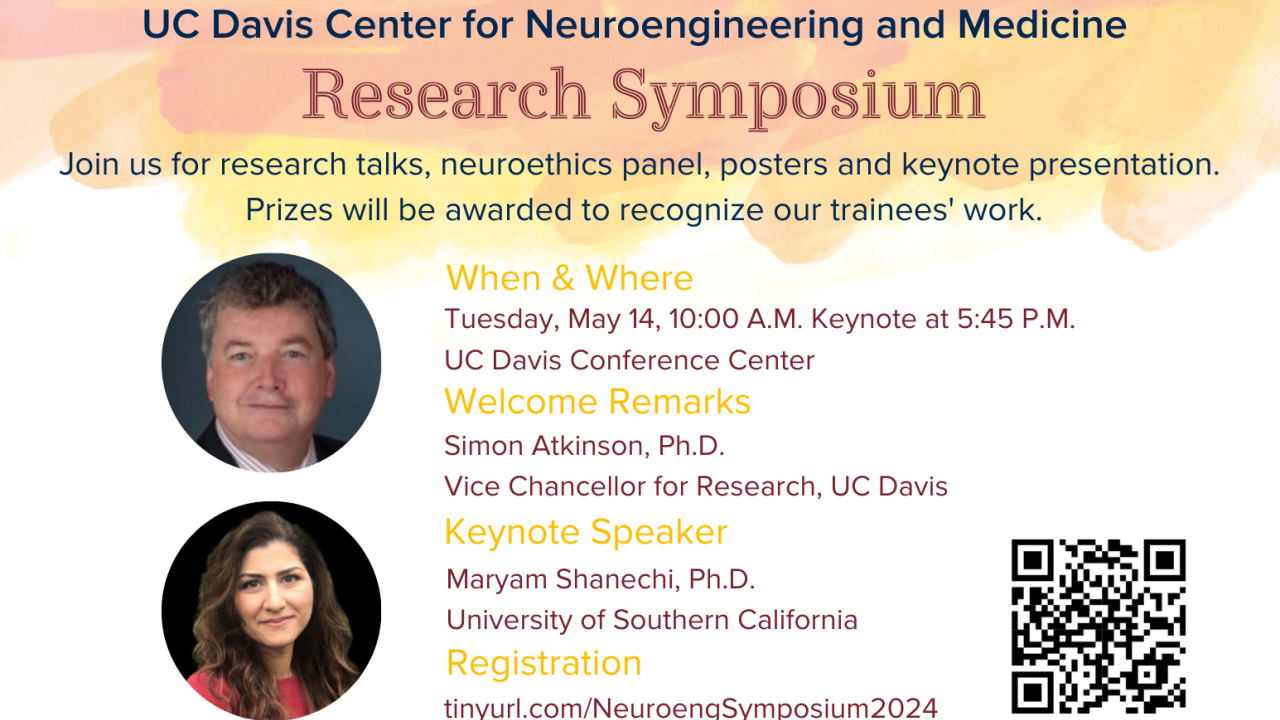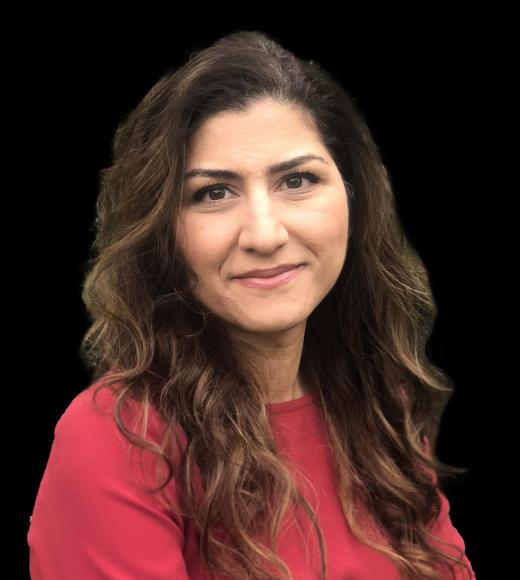
Event Date
The Center for Neuroengineering and Medicine will host its 3rd Annual Research Symposium on Tuesday, May 14, 10:00am-6:45pm, at the UC Davis Conference Center (map) on the Davis campus.
The symposium will bring together neuroengineering faculty, physician-scientists, clinicians, students, and postdocs from engineering, medicine, neuroscience and other fields to share research results and network with like-minded researchers. Presenters include faculty, graduate students and other trainees at UC Davis. Trainees will compete for awards. We are delighted to have Dr. Maryam Shanechi as keynote speaker. Dr. Shanechi is Dean’s Professor in Electrical and Computer Engineering, Computer Science, Biomedical Engineering, and Neuroscience Graduate Program at the University of Southern California (USC), as well as Founding Director of the newly established USC Center for Neurotechnology.
Registration is required: https://tinyurl.com/NeuroengSymposium2024
Keynote Speaker: Professor Maryam Shanechi, USC
AI-based Closed-loop Neurotechnologies for Neurological and Mental Disorders

Maryam M. Shanechi, PhD is Dean’s Professor in Electrical and Computer Engineering, Computer Science, Biomedical Engineering, and Neuroscience Graduate Program at the University of Southern California (USC). She is also Founding Director of the newly established USC Center for Neurotechnology. She received her B.A.Sc. degree in Engineering Science from the University of Toronto, her M.S. and Ph.D. degrees in Electrical Engineering and Computer Science from MIT, and her postdoctoral training in Neural Engineering and Neuroscience at Harvard Medical School and UC Berkeley. She conducts research at the intersection of engineering, computation, and neuroscience to develop closed-loop neurotechnology and study the brain through decoding and control of neural dynamics. She is the recipient of several awards including the NIH Director’s New Innovator Award, NSF CAREER Award, ONR Young Investigator Award, ASEE’s Curtis W. McGraw Research Award, MIT Technology Review’s Top 35 Innovators Under 35, Popular Science Brilliant 10, Science News SN10, One Mind Rising Star Award, and a DoD Multidisciplinary University Research Initiative (MURI) Award. She is a Fellow of the IEEE and was named a 2023 Blavatnik National Awards Finalist.
Abstract
I will present our work at the interface of AI, control theory, and neuroscience to develop next-generation brain-machine interfaces that can model, decode, and regulate the activity of large populations of neurons in brain disorders such as major depression. First, I present a dynamical modeling framework that can decode brain states such as mood from human brain network activity. Then, I show how we can also predict the effect of external inputs such as electrical stimulation on brain network activity to enable closed-loop regulation of neural states. I also extend our modeling framework to dissociate behaviorally relevant neural dynamics that can otherwise be missed, such as those during naturalistic movements. I also present how these models can incorporate multiple spatiotemporal scales of brain activity simultaneously. Finally, I discuss the challenge of developing deep learning algorithms for real-time neurotechnologies. I present an artificial neural network that enables accurate and flexible inference of brain states causally, non-causally, and even with missing neural samples, which can happen in wireless brain-machine interfaces. These AI-based models, decoders, and controllers can help restore lost motor and emotional function in millions of patients with brain disorders.
Agenda
| 10:00am | Registration and networking |
| 10:40am | Welcome - Simon Atkinson, PhD, Vice Chancellor for Research, UC Davis |
| 10:50am | Center for Neuroengineering and Medicine - An Overview. Jochen Ditterich, PhD |
| 11:00am | Oral presentation - Harshavardhana Gowda, PhD Student, Electrical and Computer Engineering Graduate Program, The Speech Neuroengineering and Cybernetics Laboratory (PI: Lee Miller, PhD) |
| 11:15am | Oral presentation - Maitreyee Wairagkar, PhD, Postdoctoral Fellow, UC Davis Neuroprosthetics Lab (PIs: David Brandman, MD, PhD, Sergey Stavisky, PhD) |
| 11:30am | Oral presentation - Ariana Moghbel, MD/PhD Student, Neuroscience Graduate Group (PI: Sheela Toprani, MD, PhD) |
| 11:45am | Oral presentation - Peyton Young, PhD Student, Mechanical and Aerospace Graduate Program, UC Davis BEAR Lab (PI: Jonathon Schofield, PhD) |
| 12:00pm | Lunch |
| 12:50pm | Oral presentation - Hyehyun Kim, PhD Student, Biomedical Engineering Graduate Group, The Seker Research Group |
| 1:05pm | Oral presentation - Nicholas Card, PhD, Postdoctoral Fellow, UC Davis Neuroprosthetics Lab |
| 1:20pm | Panel discussion. Neuroethics: Research and Clinical Perspectives on ‘Doing the Right Thing’
|
| 2:10pm | Group picture |
| 2:20pm | Poster session |
| 3:50pm | Research short talks
|
| 4:30pm | Awards |
| 4:50pm | Dinner |
| 5:45pm | Keynote presentation: AI-based Closed-loop Neurotechnologies for Neurological and Mental Disorders Maryam M. Shanechi, PhD, USC A recording is available to UC Davis affiliates at this link. |
| 6:45pm | Closing remarks |
We look forward to seeing you!
Comments or questions? Contact us here!
Parking Information
Please allow 15 minutes for parking.
Gateway Parking Structure: http://campusmap.ucdavis.edu/?l=30
Visitor Parking VP 1: http://campusmap.ucdavis.edu/?l=32
Visitor Parking VP 2: http://campusmap.ucdavis.edu/?l=33
Parking app: Use AMP Park App to pay for parking from your phone.
Internet access for visitors and guests: create a UCD-Guest account
The campus offers a UCD-Guest wireless network intended for visitors. To create a guest WiFi account, simply select ucd-guest as your wireless network and follow the instructions when you open your browser.
Symposium Planning Committee
The committee is composed of members of the Steering Committee of the Center for Neuroengineering and Medicine, the Center Co-Directors, and the Associate Director.
